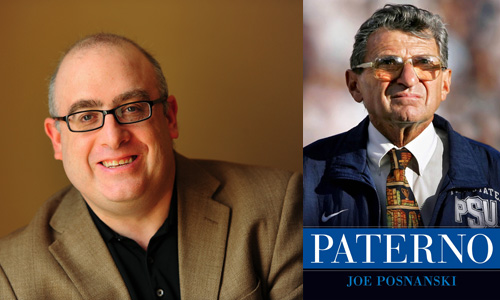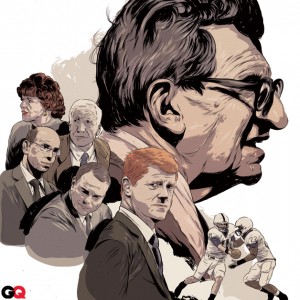 Talk about bringing a knife to a gunfight…
Talk about bringing a knife to a gunfight…
This journalistic contest was over before it started. In an attempt to breath relevance into the review of a book certain to be covered by the biggest guns in journalism, the Kansas City Star tossed a saddle on a little known, relatively inexperienced writer and laid down a bunt of a book review of former Star sports scribe Joe Posnanski‘s “Paterno.”
Given the circumstances, it’s one of the weakest book reviews I can recall.
 Not because it’s godawful or dreadfully written – freelance writer Sebastian Stockman, a college prof, can obviously write. However, given all that was known and discussed, this review needed to pull no punches and set the record straight on whether good guy Posnanski delivered the hard edged goods.
Not because it’s godawful or dreadfully written – freelance writer Sebastian Stockman, a college prof, can obviously write. However, given all that was known and discussed, this review needed to pull no punches and set the record straight on whether good guy Posnanski delivered the hard edged goods.
It really doesn’t.
Take this quote as a summary of Posnanski’s overall effort: “Posnanski has done his best.”
Is it me, or does that sound a bit trite?
“Yes, Posnanski has written a good, if frustrating book,” Stockman adds, likening the effort to a “five act tragic opera” and later adding, “Those who followed Posnanski’s work in The Star will find familiar ground here, as his storytelling is as fluid as ever.”
Unfortunately, some things never change, even when circumstances dictate otherwise.
Stockman’s assertion though that “every now and then (Posnanski’s) sharp reporter’s eye is on display” is a complete reach. The last thing Posnanski was is a reporter – let alone one with a sharp reporter’s eye. Posnanski has a sharp eye alright, but seldom (if ever) for reporting. His is an eye for what some might call “color commentary.”
 Cleverly worded descriptions and visuals, totally – hard news reporting, no way.
Cleverly worded descriptions and visuals, totally – hard news reporting, no way.
The Star review takes two anecdotes from the book as kickers; one about one of Paterno’s daughters eating a cucumber at a restaurant, the other about the coach wrestling with how to quantify the number of sick days during his career.
Huh?
The New York Times on the other hand delivers the goods.
“Paterno was to modern college football as the Amish are to Insane Clown Posse,” Dwight Garner writes. “He sealed his reputation in 1973 when he turned down more than a million dollars to coach the New England Patriots. His beautiful comment: “How much money does one man need?
“He was such a moral authority that when scandal touched him, he had, like the stewardess sucked from an airplane in James Dickey’s famous poem ‘Falling,’ a long way to drop. His longtime defensive coordinator Jerry Sandusky turned out to be a serial molester of boys, and Paterno did not do enough to stop him.”
Simple and colorfully to the point.
“Joe Pa, as they called him at Penn State, began to look Nixonian,” Garner continues. “You could suddenly imagine the comic actor Eugene Levy portraying him on screen as a lecherous dweeb, his trousers hiked up to his nipples. Penn State fired him and later hauled away his statue, a Saddam Hussein moment. One of the most strangely touching moments in ‘Paterno,’ Joe Posnanski’s new biography, is learning that this prudish coach had to ask one of his sons, ‘What is sodomy, anyway?’ ”
Garner displays a deft touch quantifying the degree of difficulty Posnanski faced in writing the book:
 “He had thus had the worst literary timing since Aldous Huxley’s. Huxley had the misfortune to die the day President John F. Kennedy was killed in Dallas. No one knew for months that he was gone.”
“He had thus had the worst literary timing since Aldous Huxley’s. Huxley had the misfortune to die the day President John F. Kennedy was killed in Dallas. No one knew for months that he was gone.”
And Garner was direct in letting readers know Posnanski fell short of the mark.
“Paterno” is breezy and largely sympathetic,” Garner writes. “It doesn’t contain (reverse spoiler alert) any especially startling revelations about what Paterno knew and when he knew it. It adds grain and texture to the historical record, though, while mostly skimming the surface of its subject’s life.”
In other words, the one writer in a position to get to the bottom of things where Paterno was concerned – Posnanski – failed at the task. Garner goes on to describe an example of the book’s “relative slightness” that “can stand in for many.”
Garner’s review ends with a bang, not the whimper the Star’s does.
“The book’s primal moment arrives in its final section,” Garner writes. “Mr. Posnanski sits alone with Paterno, who has already been fired and has learned he has lung cancer, at his kitchen table. “So,’ Paterno asks him, ‘what do you think of all this?’
“Mr. Posnanski writes: ‘I told him that I thought he should have done more when he was told about Jerry Sandusky showering with a boy. I had heard what he had said about not understanding the severity, not knowing much about child molestation, not having Sandusky as an employee. But, I said: ‘You are Joe Paterno. Right or wrong, people expect more from you.’
“The author adds: ‘He did not try to defend or deflect. He simply said, “I wish I had done more,” again, and then he descended into another coughing fit.’ ”










I really, really, really, doubt that JoPa asked JoPo “what do you think of all this?” If indeed that question was asked I doubt that JoPo would summon the courage to be so frank in his response to someone he idolized, literally hours removed from his fall from grace, when both men were most likely still in a state of shock for very different reasons.
The one thing his book does reveal is that Paterno and Sandusky didn’t much like each other. Jerry Sandusky is now penning a book from behind bars. Sandusky is the one person in all of this that knows who knew what and when they new it along with all of the who, what, when, where, why and how. That book, ironically, may be the one that sheds the most light on the subject and pounds the final nail in JoPa’s coffin.
Is anyone really surprised about this once the crap hit the fan? Did anyone really think Jopo had the intentinal fortitude to write what would have to be written about this lurid, modern tragedy?
The problem I have with The NY Times review of “Paterno” is the high-brow language, the attempt by the writer to try to impress everyone with how much he knows (or at least thinks he knows) about all manner of subjects. It reminds me of some of these God-awful reviews of poetry I occasionally see in The Star. For the record, I have no plans whatsoever to buy the book, but if I were, say, still “on the fence” about the whole thing, then I would want the review written in such a way that I could make an informed decision one way or the other. I don’t want to read what the reviewer thinks about Joe Paterno, Jerry Sandusky, Penn State, etc., etc. I simply want to know what he thinks of the author’s efforts to satisfactorily cover the subject at hand, all things considered. Is that too much to ask?
The audience for this book is extreme college football fans, aka morons, why would anyone expect a top level writer to be involved?
The book hits the shelves today I think.
I am gonna read it in the shower in honor of the kids, and hoping nothing rubs off.
(Insert your jokes here.)
I said “insert”.
We know what you are really gonna do in the shower chuck. 😉
“One of the most strangely touching moments in ‘Paterno,’ Joe Posnanski’s new biography, is learning that this prudish coach had to ask one of his sons, ‘What is sodomy, anyway?’ ” (Garner, NY Times)
– “strangely touching”? Not sure what is more unbelievable: the choice of verbiage NY Times Garner (nod toward Sandusky), or the suspension of disbelief required accept that quote attributed to Paterno.
A Catholic, a graduate of Brown University in 1950, member both the Delta Kappa Epsilon fraternity and Armed Forces/US Army ‘didn’t know’ (by inference, ‘had to ask’ his son) what ‘sodomy’ was?
A choice between feeble-mindedness advanced age, unadulterated innocence, or the myth ostrich(es) will bury its head in the sand, none the three seem to be supported by the facts as I read them. The other option is to resign yourself the possibility that Paterno embraced Pinocchio & Tommy Flanagan of SNL. Having read some rebutals and/or denials made by others (including Paterno’s family) as to the veracity Freeh’s conclusions, I’ve no idea.
Next, some writer is going to claim ‘There is no Arizona’, Babe Ruth used a corked bat, Archbishop Fulton J. Sheen does not deserve to be canonized & there was a shadowy figure on the grassy knoll in Dallas… to be certain, you had to be there, caveat emptor.
Now The Atlantic is piling on
http://www.theatlantic.com/entertainment/archive/2012/08/paterno-a-relentless-failed-defense-of-penn-states-disgraced-coach/261376/
“It’s not enough to say that Posnanski does not do well relating the facts of the Sandusky case and Paterno’s role in it. The truth is that he doesn’t really try. “Joe Paterno was fired,” he tells us at the end, “why and how the board [Penn State trustees] made its decision is not my story to tell.” If not Paterno’s biographer’s, one wonders, then whose story is it? And what is so complicated about that story? The answer to “how” the board made its decision is quickly and nearly unanimously The answer to “why” is that Paterno, as revealed in his own testimony to a grand jury and through numerous emails that have been revealed since investigations began, had full reason to suspect Sandusky’s monstrous crimes against children and did nothing to stop him.”